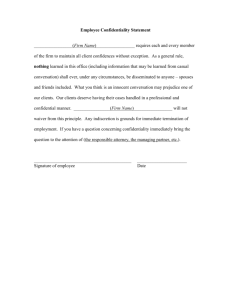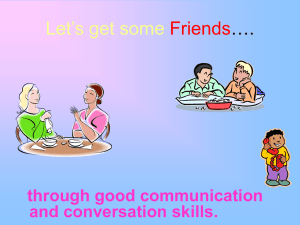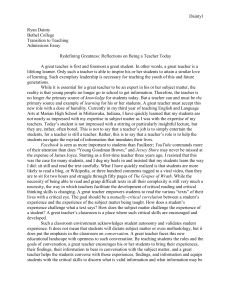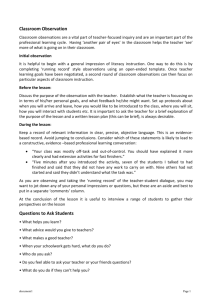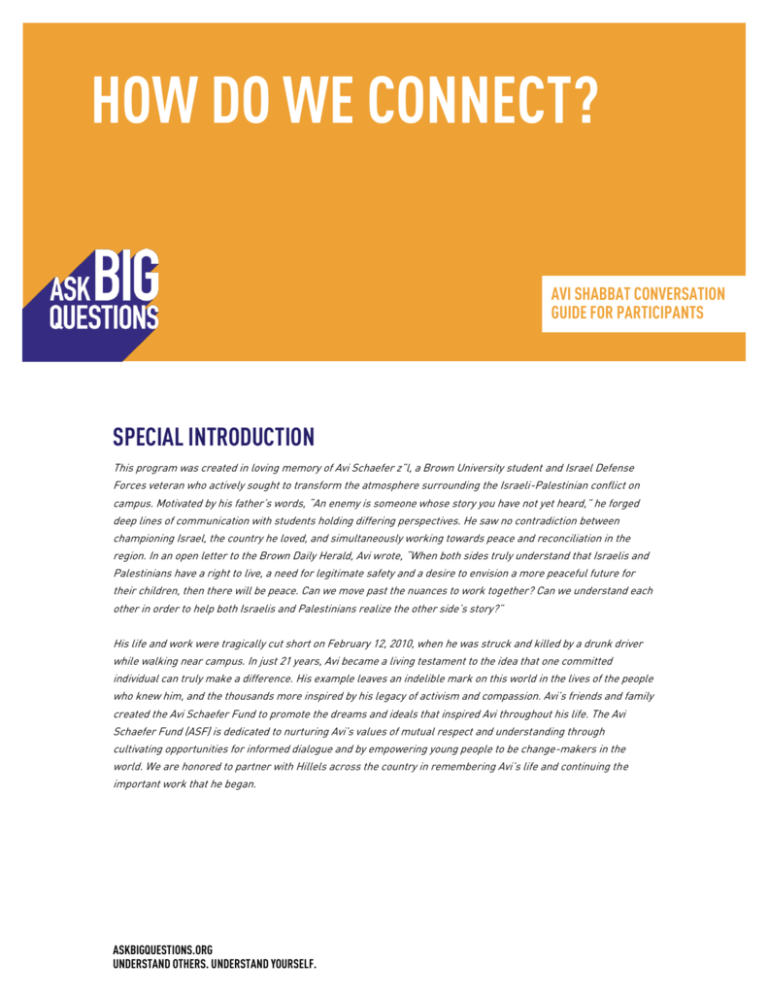
HOW DO WE CONNECT?
AVI SHABBAT CONVERSATION
GUIDE FOR PARTICIPANTS
SPECIAL INTRODUCTION
This program was created in loving memory of Avi Schaefer z”l, a Brown University student and Israel Defense
Forces veteran who actively sought to transform the atmosphere surrounding the Israeli-Palestinian conflict on
campus. Motivated by his father’s words, “An enemy is someone whose story you have not yet heard,” he forged
deep lines of communication with students holding differing perspectives. He saw no contradiction between
championing Israel, the country he loved, and simultaneously working towards peace and reconciliation in the
region. In an open letter to the Brown Daily Herald, Avi wrote, “When both sides truly understand that Israelis and
Palestinians have a right to live, a need for legitimate safety and a desire to envision a more peaceful future for
their children, then there will be peace. Can we move past the nuances to work together? Can we understand each
other in order to help both Israelis and Palestinians realize the other side’s story?”
His life and work were tragically cut short on February 12, 2010, when he was struck and killed by a drunk driver
while walking near campus. In just 21 years, Avi became a living testament to the idea that one committed
individual can truly make a difference. His example leaves an indelible mark on this world in the lives of the people
who knew him, and the thousands more inspired by his legacy of activism and compassion. Avi’s friends and family
created the Avi Schaefer Fund to promote the dreams and ideals that inspired Avi throughout his life. The Avi
Schaefer Fund (ASF) is dedicated to nurturing Avi’s values of mutual respect and understanding through
cultivating opportunities for informed dialogue and by empowering young people to be change-makers in the
world. We are honored to partner with Hillels across the country in remembering Avi’s life and continuing the
important work that he began.
ASKBIGQUESTIONS.ORG
UNDERSTAND OTHERS. UNDERSTAND YOURSELF.
1. WELCOME
Before we begin, we need to agree on a few things:
In order for our conversation to be as rich as it can be, we need everyone to feel safe to really share and
really listen. Therefore, what is said in this conversation stays in this conversation, and may not be repeated
outside it.
Our aim is to create a space where we can understand others and understand ourselves, not to give advice or
to argue ideas of objective truth. With that in mind, in this conversation we will agree to speak in the firstperson, about our own truth.
We will assume good faith in one another.
We will open ourselves to listen and learn from one another.
We won’t rush to fill the silence.
Can we all agree to these things? If you feel, for whatever reason, that you cannot agree to these things, then
please take this opportunity to exit. By staying in the circle, we all signify our intention to abide by these
commitments.
2. ASK AND SHARE
Welcome to our conversation. Let’s take a moment to introduce ourselves. Please tell us your name and where
you call home. And please also tell us about a time you connected deeply with someone else despite very different
worldviews.
You can use the space below to make some notes to yourself.
3. LEARN
There’s something of a paradox inherent in our attempts to connect with—to deeply see—one another. Walt
Whitman in his “Song of Myself,” articulated this in a way, saying on the one hand, “For every atom belonging to
me as good belongs to you,” and, on the other, “(I am large, I contain multitudes.)” Even if we want, desperately, to
give over all of ourselves to another, how can we if we are so large, so vast, encompassing so much? That is, in
which ways is it possible to connect with others, and in which… not?
ASKBIGQUESTIONS.ORG
UNDERSTAND OTHERS. UNDERSTAND YOURSELF.
From one perspective, it’s impossible to ever really know someone else. No matter how profoundly we can
connect, we’ll never have full access to his or her memories, assumptions, experiences, or ways of thinking. Add
in our attempts to come together with someone of a different culture, ethnicity, sexual orientation, religion, class
status, gender, ability level, or any one of a myriad of other things, and there are even more layers of perspective
and assumption to untangle.
But from another point of view, of course, we can know one another, and we can use the power of language and
shared experience to understand who the other in front of us really is, and to find the places of illumination in our
shared humanity. When we work to understand one another, we forge the tools to create caring communities and
build a world of kindness and love.
On the next page are two pieces that muse on the dichotomy of our specific experiences and our shared humanity.
The first is a poem by the 13th century Persian Muslim poet, mystic and theologian Jalāl ad-Dīn Muhammad Rūmī,
(often known, simply, as Rumi), and the other a quote from Zalman Schachter-Shalomi, a contemporary rabbi,
author and teacher. The Schachter-Shalomi quote is excerpted from an interview with Beliefnet in 2005. The full
interview can be found here: http://bit.ly/1b5OkPx. The Rumi poem was translated by Coleman Bark, and appears
in The Essential Rumi, first published in 1995.
Only Breath | Jalāl ad-Dīn Muhammad Rūmī
Not Christian or Jew or Muslim, not Hindu, Buddhist, sufi, or zen. Not any religion or cultural system. I am not
from the East or the West, not out of the ocean or up from the ground, not natural or ethereal, not composed of
elements at all. I do not exist, am not an entity in this world or the next, did not descend from Adam or Eve or any
origin story. My place is placeless, a trace of the traceless. Neither body or soul. I belong to the beloved, have seen
the two worlds as one and that one call to and know, first, last, outer, inner, only that breath breathing human
being.
Excerpt from “Soul Man” interview | Zalman Schachter-Shalomi
Each religion is like a vital organ. If you're integral to the planet, it is really important to be the best Jews that you
can be. If we are a healthy, vital organ of the planet, then the rest of the world will be able to heal, too. Since I've
had ecumenical dialogue with Hindus, Buddhists, Confucionists, Taoists, Christians of all sorts, Muslims, it was
getting very clear that with so many of the people I had a kinship, such that I didn't even have to apologize. I didn't
have to be ashamed to say that I love God. And once people are in that situation that they too feel that they have
that kind of kinship, then a lot of things happen in what I call spiritual intimacy.
As we reflect on these texts, here are a few questions to consider:
Interpretive Questions
What does Rumi mean when he says, “My place is placeless… I belong to the beloved.”?
Do you think Rumi literally means that he does not consider himself Muslim or “from the East or the West”?
How is Rumi situating the specifics of his context in a greater picture?
How does Reb Zalman understand the role of specific religions in the bigger picture?
How does Reb Zalman understand his purpose as a Jew?
How does Reb Zalman regard interfaith connections?
ASKBIGQUESTIONS.ORG
UNDERSTAND OTHERS. UNDERSTAND YOURSELF.
Reflective Questions
In what ways do you feel specifically rooted in your geographic, cultural, and/or religious context?
In what ways do you feel part of the universal human story?
How does, and doesn’t, your specific context impact what happens when you connect with others who are
different from you?
How do we connect with those who are different from us?
How don’t we? Are there limitations? If so, what are they?
Use the space below to write some notes to yourself.
4. DO
It’s not easy to see, to really see another person. And it’s important to enter into the attempt with humility about
the possibilities and limitations of really understanding someone else’s perspective. But engaging in the
sometimes difficult work of connecting with someone else—even, or especially, someone different from ourselves
in significant ways—can be transformational, not only for our understandings of the world and our capacity to
create community and new ways of thinking. (Though, of course, it does those things as well.) Rather, as the 20th
Century Catholic monk Thomas Merton put it, “Souls are like athletes, that need opponents worthy of them, if they
are to be tried and extended and pushed to the full use of their powers, and rewarded according to their capacity."
Our relationships with other human beings almost never offer ideal peace and serenity—but natural points of
turbulence or friction offer us a chance to address our own assumptions, agendas, impatience and selfishness in a
way we rarely do when left to our own devices. Learning how to connect with—or even love—one another is hardly
easy. But it is through the imperfect attempt to do so that we become who we were meant to be all along, as
individuals and together.
As we conclude the conversation, here are a few final questions to consider:
Has this conversation helped you come to any new insights about when and how you connect with others?
What is one thing you want to do in the next 24 hours to act something you discovered in this conversation?
What could we do together to improve our community based on what we’ve talked about here?
ASKBIGQUESTIONS.ORG
UNDERSTAND OTHERS. UNDERSTAND YOURSELF.
Feel free to use the space below to write some notes to yourself.
Thank you for being part of this conversation. Please share this conversation guide with others in your community.
And join our conversation online at AskBigQuestions.org.
The Avi Schaefer Fund (ASF) is dedicated to nurturing Avi’s values of mutual
respect and understanding through cultivating opportunities for informed
dialogue and by empowering young people to be change-makers in the world.
Learn more at avischaeferfund.org.
ASK BIG QUESTIONS IS AN INITIATIVE OF HILLEL: THE FOUNDATION FOR JEWISH CAMPUS LIFE IN
PARTNERSHIP WITH THE EINHORN FAMILY CHARITABLE TRUST. VISIT ASKBIGQUESTIONS.ORG TO
ANSWER QUESTIONS, LEARN FROM OTHERS, AND JOIN THE MOVEMENT.
©2014 HILLEL INTERNATIONAL. ALL RIGHTS RESERVED.
ASK BIG QUESTIONS® IS A REGISTERED TRADEMARK OF HILLEL INTERNATIONAL.
ASKBIGQUESTIONS.ORG
UNDERSTAND OTHERS. UNDERSTAND YOURSELF.
HOW DO WE CONNECT?
AVI SHABBAT CONVERSATION
GUIDE FOR FACILITATOR
SPECIAL INTRODUCTION
This program was created in loving memory of Avi Schaefer z”l, a Brown University student and Israel Defense
Forces veteran who actively sought to transform the atmosphere surrounding the Israeli-Palestinian conflict on
campus. Motivated by his father’s words, “An enemy is someone whose story you have not yet heard,” he forged
deep lines of communication with students holding differing perspectives. He saw no contradiction between
championing Israel, the country he loved, and simultaneously working towards peace and reconciliation in the
region. In an open letter to the Brown Daily Herald, Avi wrote, “When both sides truly understand that Israelis and
Palestinians have a right to live, a need for legitimate safety and a desire to envision a more peaceful future for
their children, then there will be peace. Can we move past the nuances to work together? Can we understand each
other in order to help both Israelis and Palestinians realize the other side’s story?”
His life and work were tragically cut short on February 12, 2010, when he was struck and killed by a drunk driver
while walking near campus. In just 21 years, Avi became a living testament to the idea that one committed
individual can truly make a difference. His example leaves an indelible mark on this world in the lives of the people
who knew him, and the thousands more inspired by his legacy of activism and compassion. Avi’s friends and family
created the Avi Schaefer Fund to promote the dreams and ideals that inspired Avi throughout his life. The Avi
Schaefer Fund (ASF) is dedicated to nurturing Avi’s values of mutual respect and understanding through
cultivating opportunities for informed dialogue and by empowering young people to be change-makers in the
world. We are honored to partner with Hillels across the country in remembering Avi’s life and continuing the
important work that he began.
ASKBIGQUESTIONS.ORG
UNDERSTAND OTHERS. UNDERSTAND YOURSELF.
Note for Facilitators: This document is designed to be the centering point for a group conversation. You should
plan for the conversation to last between 60 and 90 minutes, depending on group size. Most parts are meant to be
read by members of the group, so you should plan to ask participants to take turns reading sections. Alternatively,
you can choose the first reader of a section, and then that reader chooses the next reader. Additional guidelines
and suggestions for planning and leading a successful conversation can be found at the end of this guide.
1. WELCOME
Before we begin talking about disagreement, we need to agree on a few things:
In order for our conversation to be as rich as it can be, we need everyone to feel safe to really share and
really listen. Therefore, what is said in this conversation stays in this conversation, and may not be repeated
outside it.
Our aim is to create a space where we can understand others and understand ourselves, not to give advice or
to argue ideas of objective truth. With that in mind, in this conversation we will agree to speak in the firstperson, about our own truth.
We will assume good faith in one another.
We will open ourselves to listen and learn from one another.
We won’t rush to fill the silence.
Can we all agree to these things? If you feel, for whatever reason, that you cannot agree to these things, then
please take this opportunity to exit. By staying in the circle, we all signify our intention to abide by these
commitments.
2. ASK AND SHARE
Welcome to our conversation. Let’s take a moment to introduce ourselves. Please tell us your name and where
you call home. And please also tell us about a time you connected deeply with someone else despite very different
worldviews.
You can use the space below to make some notes to yourself.
ASKBIGQUESTIONS.ORG
UNDERSTAND OTHERS. UNDERSTAND YOURSELF.
Note for Facilitators: Give people a moment to organize their thoughts before you start asking for volunteers. It
may be helpful to model this introduction for participants, so consider introducing yourself first. Be sure everyone
states their name. You don’t need to go in order around a circle. Allow people to introduce themselves when the
spirit moves them.
3. LEARN
There’s something of a paradox inherent in our attempts to connect with—to deeply see—one another. Walt
Whitman in his “Song of Myself,” articulated this in a way, saying on the one hand, “For every atom belonging to
me as good belongs to you,” and, on the other, “(I am large, I contain multitudes.)” Even if we want, desperately, to
give over all of ourselves to another, how can we if we are so large, so vast, encompassing so much? That is, in
which ways is it possible to connect with others, and in which… not?
From one perspective, it’s impossible to ever really know someone else. No matter how profoundly we can
connect, we’ll never have full access to his or her memories, assumptions, experiences, or ways of thinking. Add
in our attempts to come together with someone of a different culture, ethnicity, sexual orientation, religion, class
status, gender, ability level, or any one of a myriad of other things, and there are even more layers of perspective
and assumption to untangle.
But from another point of view, of course, we can know one another, and we can use the power of language and
shared experience to understand who the other in front of us really is, and to find the places of illumination in our
shared humanity. When we work to understand one another, we forge the tools to create caring communities and
build a world of kindness and love.
On the next page are two pieces that muse on the dichotomy of our specific experiences and our shared humanity.
The first is a poem by the 13th century Persian Muslim poet, mystic and theologian Jalāl ad-Dīn Muhammad Rūmī,
(often known, simply, as Rumi), and the other a quote from Zalman Schachter-Shalomi, a contemporary rabbi,
author and teacher. The Schachter-Shalomi quote is excerpted from an interview with Beliefnet in 2005. The full
interview can be found here: http://bit.ly/1b5OkPx. The Rumi poem was translated by Coleman Bark, and appears
in The Essential Rumi, first published in 1995.
Only Breath | Jalāl ad-Dīn Muhammad Rūmī
Not Christian or Jew or Muslim, not Hindu, Buddhist, sufi, or zen. Not any religion or cultural system. I am not
from the East or the West, not out of the ocean or up from the ground, not natural or ethereal, not composed of
elements at all. I do not exist, am not an entity in this world or the next, did not descend from Adam or Eve or any
origin story. My place is placeless, a trace of the traceless. Neither body or soul. I belong to the beloved, have seen
the two worlds as one and that one call to and know, first, last, outer, inner, only that breath breathing human
being.
ASKBIGQUESTIONS.ORG
UNDERSTAND OTHERS. UNDERSTAND YOURSELF.
Excerpt from “Soul Man” interview | Zalman Schachter-Shalomi
Each religion is like a vital organ. If you're integral to the planet, it is really important to be the best Jews that you
can be. If we are a healthy, vital organ of the planet, then the rest of the world will be able to heal, too. Since I've
had ecumenical dialogue with Hindus, Buddhists, Confucionists, Taoists, Christians of all sorts, Muslims, it was
getting very clear that with so many of the people I had a kinship, such that I didn't even have to apologize. I didn't
have to be ashamed to say that I love God. And once people are in that situation that they too feel that they have
that kind of kinship, then a lot of things happen in what I call spiritual intimacy.
As we reflect on these texts, here are a few questions to consider:
Interpretive Questions
What does Rumi mean when he says, “My place is placeless… I belong to the beloved.”?
Do you think Rumi literally means that he does not consider himself Muslim or “from the East or the West”?
How is Rumi situating the specifics of his context in a greater picture?
How does Reb Zalman understand the role of specific religions in the bigger picture?
How does Reb Zalman understand his purpose as a Jew?
How does Reb Zalman regard interfaith connections?
Reflective Questions
In what ways do you feel specifically rooted in your geographic, cultural, and/or religious context?
In what ways do you feel part of the universal human story?
How does, and doesn’t, your specific context impact what happens when you connect with others who are
different from you?
How do we connect with those who are different from us?
How don’t we? Are there limitations? If so, what are they?
Use the space below to write some notes to yourself.
Note for Facilitators: This is the heart of the conversation. Give people several minutes to prepare their thoughts.
Then, if you would like, you can invite people to divide into pairs or triads and share their responses. Give them a
ASKBIGQUESTIONS.ORG
UNDERSTAND OTHERS. UNDERSTAND YOURSELF.
good amount of time for this—10-20 minutes. It may be longer, depending on how much momentum they develop.
Then reconvene in the large group and ask people to share from their small-group conversations.
A few tips on facilitation:
The large-group debrief should take another 20-30 minutes.
Begin by asking for a volunteer to share an insight from their conversation. You might begin by asking, “What
came up?”
When each person is done, thank them for their comment.
Don’t feel a need to rush or to fill silences.
If someone begins to monopolize the time, you might say, “I want to be sure that everyone has a chance to
speak, so let’s try to make room for another person.”
For other ideas on facilitation, please refer to the AIR-IT guide at the end of this document. When you sense that
the group has finished sharing its responses to these questions, invite people to share any further insights or
reflections from the conversation, before moving to the conclusion.
4. DO
It’s not easy to see, to really see another person. And it’s important to enter into the attempt with humility about
the possibilities and limitations of really understanding someone else’s perspective. But engaging in the
sometimes difficult work of connecting with someone else—even, or especially, someone different from ourselves
in significant ways—can be transformational, not only for our understandings of the world and our capacity to
create community and new ways of thinking. (Though, of course, it does those things as well.) Rather, as the 20 th
Century Catholic monk Thomas Merton put it, “Souls are like athletes, that need opponents worthy of them, if they
are to be tried and extended and pushed to the full use of their powers, and rewarded according to their capacity."
Our relationships with other human beings almost never offer ideal peace and serenity—but natural points of
turbulence or friction offer us a chance to address our own assumptions, agendas, impatience and selfishness in a
way we rarely do when left to our own devices. Learning how to connect with—or even love—one another is hardly
easy. But it is through the imperfect attempt to do so that we become who we were meant to be all along, as
individuals and together.
As we conclude the conversation, here are a few final questions to consider:
Has this conversation helped you come to any new insights about when and how you connect with others?
What is one thing you want to do in the next 24 hours to act something you discovered in this conversation?
What could we do together to improve our community based on what we’ve talked about here?
Feel free to use the space below to write some notes to yourself.
ASKBIGQUESTIONS.ORG
UNDERSTAND OTHERS. UNDERSTAND YOURSELF.
Give people a minute to reflect on the question. Then ask anyone who wants to share to do so. When you sense that
the group has finished sharing its response to this question, invite people to share any further insights or
reflections from the conversation, before moving to the conclusion.
Thank you for being part of this conversation. Please share this conversation guide with others in your community.
And join our conversation online at AskBigQuestions.org.
The Avi Schaefer Fund (ASF) is dedicated to nurturing Avi’s values of mutual
respect and understanding through cultivating opportunities for informed
dialogue and by empowering young people to be change-makers in the world.
Learn more at avischaeferfund.org.
ASK BIG QUESTIONS IS AN INITIATIVE OF HILLEL: THE FOUNDATION FOR JEWISH CAMPUS LIFE IN
PARTNERSHIP WITH THE EINHORN FAMILY CHARITABLE TRUST. VISIT ASKBIGQUESTIONS.ORG TO
ANSWER QUESTIONS, LEARN FROM OTHERS, AND JOIN THE MOVEMENT.
©2014 HILLEL INTERNATIONAL. ALL RIGHTS RESERVED.
ASK BIG QUESTIONS® IS A REGISTERED TRADEMARK OF HILLEL INTERNATIONAL.
ASKBIGQUESTIONS.ORG
UNDERSTAND OTHERS. UNDERSTAND YOURSELF.
AIR-IT: A GUIDE TO FACILITATING CONVERSATION
A: ASK BIG QUESTIONS.
Big Question
Hard Question
Anyone can answer it.
Experts will answer it best.
Example: “For whom are we responsible?”
Example: “What is the best economic policy for the
United States?”
Focuses on wisdom and experience.
Focuses on intelligence and skill.
Example: “What’s the best advice you’ve ever received?” Example: “Are human beings naturally good or evil?”
Uses plain language.
Uses technical language.
Directed at a subject (me, you, us).
Directed at an object (it).
Example: “What could we sacrifice to change the world?” Example: “Is it better to cut spending or raise taxes to
balance the federal budget?”
Opens up space and invites people in as participants.
Closes space and leads people to feel like spectators.
Leads to sharing personal stories.
Leads to debates about truth claims.
Emphasizes a both/and approach.
Emphasizes an either/or approach.
I: INVITE PERSONAL STORIES.
Big questions lead to sharing personal stories. The facilitator acts to support this by:
Creating the space (physical, intellectual, emotional, spiritual) of trust in which these stories can be shared
and honored.
Weaving: Summarize, reflect back, and keep the stories and observations tethered to the big question. This
helps the group to maintain integrity and not feel that it is fragmenting or fraying.
R: REALLY LISTEN.
Ask Big Questions conversations are marked by real listening. The facilitator’s reflecting back and weaving is
crucial to this. Participants should be able to answer questions like: “What did so-and-so say? What do you think
they meant when they said it? What did it evoke in you?”
IT: USE INTERPRETIVE THINGS.
Ask Big Questions conversations often use a text, poem, artwork, song, natural object or other “interpretive thing”
to help center the conversation and create a common point of access for all participants.
ASKBIGQUESTIONS.ORG
UNDERSTAND OTHERS. UNDERSTAND YOURSELF.
QUESTIONS TO ASK WHEN PREPARING FOR A DISCUSSION
Where?
Does the place where you’re having the conversation create a space in which people can feel safe?
Is it a closed space? Does it have a door you can close to ensure privacy and confidentiality when needed?
What can you do to make the space visually appealing or lovely? Does it have windows to let in light? Do you
want to play some music?
Can everyone sit comfortably in a circle?
When?
Are you scheduling the conversation at a time when everyone can be physically awake and present?
Will people be hungry? Will you provide food or drink?
Will they be tired or sleepy after a meal?
How long will the conversation be?
How will you break up the time if necessary?
Who and How?
How many people will participate? Will there be enough to sustain diverse conversation? Will there be too
many to keep the conversation centered?
How will you get the word out and then remind people?
Do you need to make any special arrangements for people with special needs (i.e. physical disabilities)?
Greetings – Who will welcome people to the conversation and how will they do it?
How will you have everyone introduce themselves? (Big Questions are great for introductions!)
How will you close the conversation?
How will you follow up with people?
How will you capture their contact information?
What About You?
What will you do to get yourself ready?
ASKBIGQUESTIONS.ORG
UNDERSTAND OTHERS. UNDERSTAND YOURSELF.



